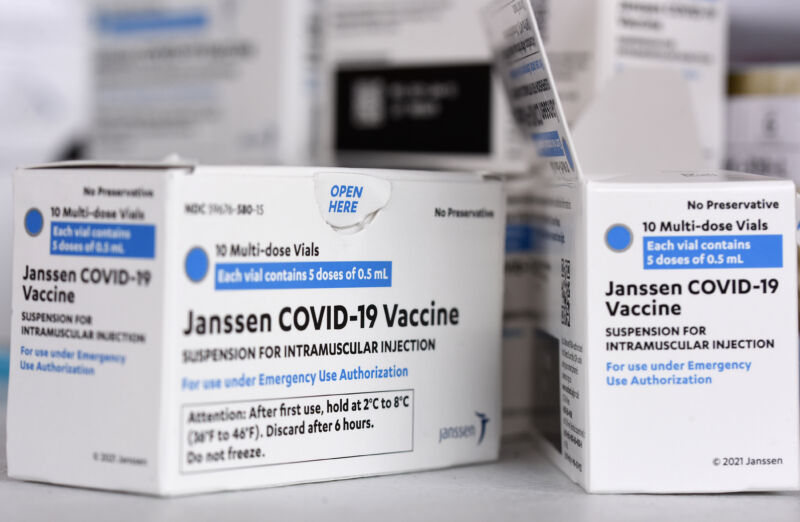
A committee of independent advisors for the Food and Drug Administration on Friday voted unanimously in favor of authorizing a second dose of the Johnson & Johnson COVID-19 vaccine to everyone 18 years of age and older, two or more months after a person has received the first dose.
It is the third time the FDA’s advisory committee has recommended additional COVID-19 doses in recent weeks to bolster protection. But the reviewed data, discussion, and vote today were significantly different from the booster-authorization meetings for Pfizer/BioNTech and Moderna COVID-19 vaccines.
Dose two
The J&J vaccine has consistently lagged behind the two mRNA vaccines in efficacy against COVID-19. Some estimates have put the J&J vaccine’s effectiveness against COVID-19 hospitalization as low as 68 percent, while the two mRNA vaccines have seen estimates of effectiveness against hospitalization in the high 80s to low 90s. Recent data suggests that the mRNA vaccines’ protection against infection may start waning six or more months after primary doses—particularly in older and more vulnerable people. This data prompted the push for boosters. But such waning does not appear to be happening with the J&J vaccine.
The one-and-done vaccine seems to be holding steady in its effectiveness against infections and severe disease. Instead of arguing that a second shot can restore high levels of protection—as was the argument for mRNA vaccine boosters—representatives for J&J today argued for a second shot that could improve upon protection generated after the first. The company presented data suggesting that a second dose given at least two months after the first could push vaccine effectiveness against symptomatic disease from 53 percent to 75 percent and could hike antibody levels 3.5- to 6-fold.
The company also presented data on offering a second dose six months after the first dose. The data suggested even larger increases in antibody levels. But those results hinged on data from just 17 people, and the committee largely felt that study was not convincing enough to recommend a second dose only after that time period. Some also noted the practical matter that for many people who received the J&J vaccine, it has already been around six months since their first dose.
Overall, the committee—the Vaccines and Related Biological Products Advisory Committee (VRBPAC)—voted 19-to-0 in favor of the FDA authorizing a second dose of the J&J vaccine after two months. There was some discussion about whether the dose should be considered a booster or a second dose that is part of the primary immunization.
Combinations
After the vote, the committee discussed the results of a fresh mix-and-match trial. Researchers released preliminary results earlier this week from a small trial testing nine combinations of primary and booster vaccines. The main finding was that the mixed vaccination regimens (having a booster from a different company than the initial vaccine) were as good as, if not better than, the regimens that included only one type of vaccine. The data also hinted that boosting with the Moderna mRNA vaccine offered the strongest protection, regardless of the starting vaccine, and boosting with the J&J vaccine gave the weakest protection, particularly for people who had initially received a J&J vaccine.
The data presentation segued into a discussion aimed at assessing what data VRBPAC would want to see to authorize mix-and-match booster options—particularly authorizing mRNA vaccine boosters for people vaccinated with a J&J vaccine. The committee offered a range of points and perspectives. Some suggested seeing more safety data and longer term, in-depth efficacy data. Others said they were already convinced by the mix-and-match data.
A representative from the Centers for Disease Control and Prevention emphasized that the agency is not looking for a recommendation of specific mix-and-match combinations; rather, it wants to determine if mixing and matching should be generally approved. Such flexibility could come in handy in cases where the availability of a vaccine type is scarce or for people who are at risk or concerned about a side effect from a particular vaccine.
Peter Marks, director of the FDA’s Center for Biologics Evaluation and Research, made it clear at several points in today’s meeting that the agency is keen to find a path forward for mix-and-match vaccine boosting.
https://arstechnica.com/?p=1804634

